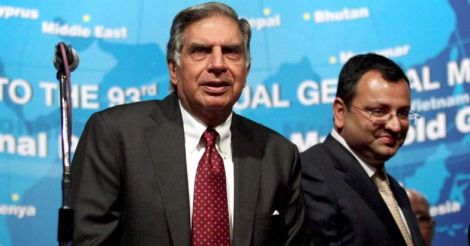Kochi: The palace coup at Tata Sons is now a hot topic of debate amongst legal advisers of the company. Many feel that backstage activities reminiscent of a royal coup had played out their parts in the events that finally led to the unceremonious ouster of Cyrus Mistry from the helm of the company.
They are also divided on what decision the National Company Law Tribunal would take on the issue even as the lack of clarity surrounding the ouster of Mistry continues to be hazy.
Some legal observers feel that it is not possible to oust the chair through a measure that was not listed in the agenda of the meeting. On the other hand, some believe that such a move has legal validity provided it may be proved that urgent compulsions warranted the move.
If the chair has to be removed from his or her position, a notice of two weeks has to be given and the move has to be listed in the agenda of a meeting. However, in this case, the ouster was a surprise move with the issue being considered under the 'any other matter' category during the meeting. Normally, issues that are considered even though they do not find mention in the agenda are CSR or other less relevant issues related to the company. Considering the moves that led to exit of Mistry, it may be said that the firm did not follow accepted provisions of company laws.
However, such a move is warranted if circumstances leading to such a move are emergent. Tata would try to back its argument highlighting this provision of the law. However, the onus would be on the company to prove what imperative constraints made such a move expeditious. On the other hand, Mistry might have enough room to argue that he was ousted out of personal grudge.
If the tribunal accepts the position of Tata Sons, Mistry has the choice to go to the appellate tribunal. Even if rebuffed there, he still has the Supreme Court to submit his plea. The fact that the same levels of escalation are also available to Tata Sons suggests that the processes of the law could be arduous and long provided both sides are persistent on their respective intents. As far as Mistry is concerned, such a prolonged legal battle might not be worth the effort because even if he’s reinstated, it could be on the grounds that the company did not apply mandatory norms for his dismissal. In such a situation, the company can prepare for another ouster, adhering to all norms, in as short a gap of two weeks thence.
Tata, which has assiduously refrained from being entangled in controversies so far, might have to prepare for its fair share of public glare until relevant issues are sorted out amicably.
























 Ratan Tata and Cyrus Mistry | File Photo: PTI
Ratan Tata and Cyrus Mistry | File Photo: PTI